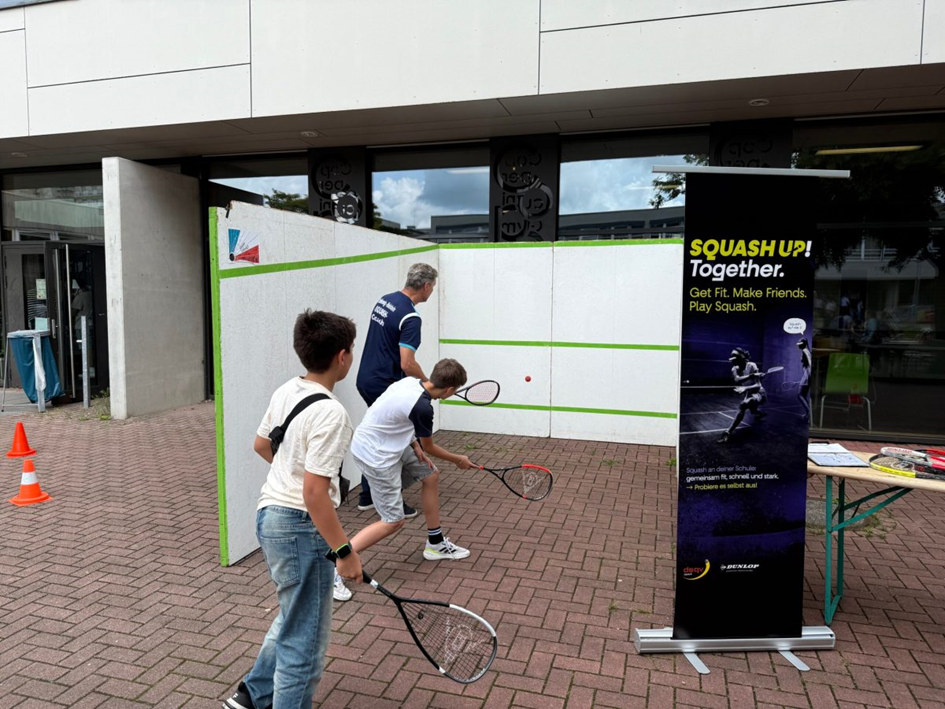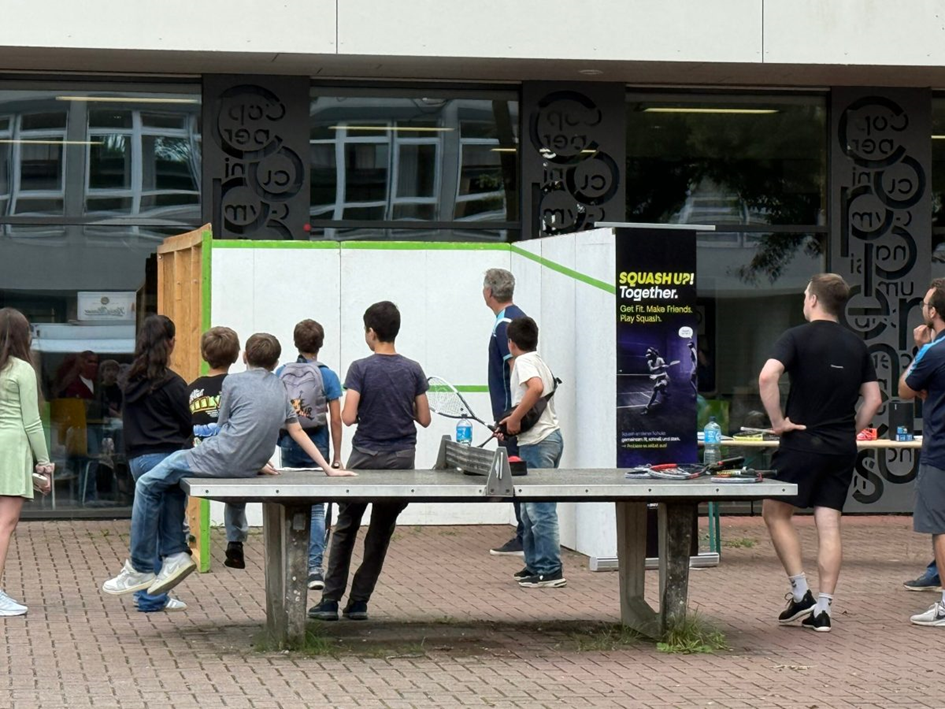From School Squash to Student Nights: SquashUP Reenergizes the Sport in Germany
- Markus Gaebel

- 4 days ago
- 6 min read

Squash Up, an initiative designed to revitalize squash in Hamburg and beyond, has been launched by former German champion Simon Frenz, squash player Martin Meyer, and Ralph Faust, a lecturer at Fresenius University.
This dynamic trio—working in collaboration with the Hamburg Squash Association and under the strategic guidance of the German Squash Federation (DSQV)—aims to create a scalable model that can be replicated across Germany.
Currently, Squash Up focuses on two main pillars:
Teacher training for school-based squash programs, and
“Squash Up! Nights” – social events aimed at engaging university students.
Here’s an update on both initiatives:
Squash Goes to School: Model Program Debuts in Norderstedt
The Coppernicus Gymnasium in Norderstedt, just north of Hamburg, has become the country’s first “squash model school” under the national Squash Up! initiative. Earlier this month, the school hosted a lively Tag der offenen Tür (open house) where students, parents, and staff got a hands-on introduction to squash. A mobile squash court set up on the schoolyard drew crowds of curious pupils, with four coaches from the region on hand to teach basics. “One-Wall-Squash will soon be installed at the school,” explained Simon Frenz, a co-initiator of Squash Up!, referring to an outdoor single-wall court that can easily fit on campus. He was also pleased to have a local squash center just minutes’ walk away on board. “Squash will be included in the racket sports section of PE classes in the new school year! That’s a great thing and a concrete result,” Frenz said, noting that after an initial workshop with teachers, a detailed program for squash in the curriculum is now being developed.
There was a lively buzz around the mobile squash court of the Schleswig-Holstein Squash Association during the open house at Coppernicus School in Norderstedt – Photo: Martin Meyer

School leaders say the timing was perfect. “We want to integrate new sports at our school. The contact with the Squash Up! initiative came at an ideal time – up to now we’ve mainly had volleyball and badminton,” said Henning Scholz, a sports teacher and coordinator at Coppernicus Gymnasium. In the past two months, about ten educators at the school underwent squash training, with a second training session slated for September. The regional squash federation even provided a portable court for the open house, allowing dozens of youngsters to try hitting a ball against the wall. Organizers plan to use one-wall courts as a cost-effective way to bring the sport onto campus, since the area has only two traditional squash courts nearby. Thanks to a partnership with a nearby squash facility, students will also have access to proper courts for practice and instruction. “Short-term we want to get squash into school sports during the next school year. The long-term vision is to partner with many schools nationwide,” Frenz said of the pilot program’s broader goals. Early results are promising: the Norderstedt open day introduced many children to squash for the first time and generated buzz among parents and faculty about making squash a fixture in the school’s sports offerings.
“Squash Up!” Nights Engage University Students
Meanwhile in Hamburg, a series of casual squash events is attracting a new generation of players on local campuses. Billed as “Squash Up! Your Night,” the events are part of the same DSQV-backed initiative but aimed at university students and young adults. The first Squash Up! night, held at Hamburg’s Kaifu Lodge in late March, was “sold out with over 100 registrations” – roughly two-thirds of attendees had never played squash before. “That’s exactly the target group we want,” said Simon Frenz, who helped launch the program. “Our goal isn’t to make people who already play squash better, but to show people who don’t know squash what it is... Ideally, we make them love it so they’ll play casually for the next ten years,” he explained, emphasizing a focus on fun and broad participation over elite performance.
The Squash Up! nights blend light competition with a social, welcoming atmosphere. Rather than formal tournaments, the organizers set up friendly round-robin games and training clinics geared toward beginners. At a follow-up event in June – hosted by the Sportwerk club in Hamburg’s Eimsbüttel district – participants were split into groups and guided by experienced coaches who taught squash basics and techniques in an engaging way. Midway through the evening, those interested could join a mini-tournament for beginners, while others kept playing casually. After the on-court action, everyone gathered for food, drinks, music and even party games at the squash center, turning the night into a social event as much as a sports clinic. “We want to offer lots of different matchups in a short time. But just as important as the squash is the socializing – with a big grill, drinks and music,” explained Dominic Stalberg, who runs a participating club in Duisburg, where a parallel Squash Up! night was held in June. Each attendee even received freebies like vouchers for free court time to encourage them to keep playing.
The enthusiastic response has encouraged club owners and venue managers to get on board. “At first, [the manager] at Kaifu Lodge had no interest in the event. But he ended up pushing for the next one,” Frenz recounted of the initial skepticism some facility operators had. After seeing dozens of new players fill their courts, attitudes changed. Sportwerk – whose owner initially had to be convinced to host the June session – came away so impressed that “he said we really ought to do this event monthly,” according to Frenz. The June Squash Up! night in Hamburg drew around 50 students (including a few returnees from March, but mostly first-timers), confirming that the demand was real. A third edition is already scheduled for September 27, returning to Kaifu Lodge, as the organizers plan to rotate through different squash venues every few months. “The student demand is there and we’re getting a lot of positive feedback – both from the participants and, almost more importantly, from the court facility owners,” Frenz noted.
Backing from Squash Authorities and Plans to Expand
Encouraged by the early success in Hamburg, the Squash Up! initiative is now looking to scale up with support from the sport’s national bodies. Frenz says he recently met with the German Squash Federation (DSQV) and its marketing arm DSMP to discuss rolling out Squash Up! events in other regions. “My vision is that we have this in 10 or 15 cities in Germany, with four events a year in each,” he said – which would mean “40, 50 tournaments every year nationwide” aimed at college students and young professionals who have never tried squash before. DSQV’s new marketing chief, Jörg Sieber, has already expressed interest in launching Squash Up! nights in Munich, and a squash club in Kiel (Schleswig-Holstein) is eager to organize an event as well. To help local organizers, the Hamburg team is compiling a how-to handbook based on their model, covering everything from promotion to event format. “We’re in the final stages of writing a kind of guide on how we did it here in Hamburg,” Frenz said, noting that it will be shared with any interested squash venues or university sports groups. “Of course, we can’t run all the tournaments in Munich or everywhere ourselves, but we’ll be there to advise so they don’t repeat the mistakes we’ve already made,” he added with a laugh. If all goes well, Frenz is optimistic that by the end of this year the concept will spread beyond Hamburg to “three or four regions” in Germany, each adapting the Squash Up! template to their local community.
These grassroots efforts come at a crucial time. Squash in Germany has been on a long downward slide since its 1980s heyday, when the country boasted around 9,000 squash courts and an estimated one million players; today, only about 900 courts remain in operation. The equation is simple: fewer courts have meant fewer players over the years. Many dedicated squash centers have shuttered, and the sport now finds itself competing with trendier racket sports like padel and pickleball for the attention of young athletes. “No courts, no players,” as one industry insider put it bluntly. In this context, the Squash Up! initiative’s early successes – from bustling schoolyard demos in Norderstedt to sold-out student nights in Hamburg – represent much-needed bright spots. By making squash accessible, fun, and social for newcomers, the program aims to spark a fresh wave of interest and lay the groundwork for a broader revival of the sport in Germany. “Whether a kid ends up playing for fun or a student keeps at it for years, that’s as much a success for us as producing a top junior player,” said Frenz, emphasizing that building a new base of enthusiasts is the ultimate goal.




Comments